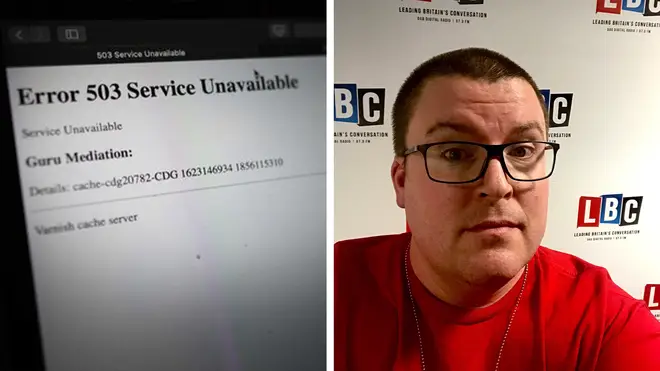
Clive Bull 1am - 4am
8 June 2021, 15:12

The great Joni Mitchell once sang “You don’t know what you’ve got till it’s gone” and for a little under an hour this morning we all took to what was left of the Internet to complain that it wasn’t working very well.
At around 11am this morning Twitter and the downdetector website began lighting up with reports of many websites not working, and soon it became apparent to Internet watchers/nerds like me that something had gone quite wrong - this wasn’t a blink and you’ll miss it blip, and the reports of affected websites continued to grow,
We saw websites like Amazon, The Guardian, The New York Times and even http://Gov.UK rendered useless - not even able to load an apology. It was like they were switched off.
And it soon became apparent that it wasn’t just websites too - other online services like our Global Player stopped operating, and while millions took to Twitter to complain the Internet was broken, Twitter itself was hobbling along, unable to share photos or emojis. For an hour, the Internet was decidedly under the weather.
Despite initial concerns pointing towards Amazon Web Services (Amazon has a HUGE online services business as well as its retail operation) - it soon became apparent another of the increasingly complex layers of the modern Internet in 2021 had gone wrong, with the failure of a major CDN.
I can already hear Nick Ferrari asking “what the hell is a CDN Will, good morning.” Well - Content Delivery Networks are another third party service which help keep many of the Internet’s biggest sites moving. Today - an as yet unspecified failure with Fastly - one of the world’s largest CDNS caused many of the world’s most popular sites to simply stop working in a number of countries including the US and Europe-wide.
CDNs exist to load pages quickly, and also do some clever techy stuff behind the scenes to ensure our favourite sites don’t grind to a halt when loads of us are viewing them. Let’s say you’re looking at the LBC website from Japan - a CDN would store lots of the website locally in Asia, rather than having to load information from the UK or Europe. The tech behind CDNs would save an online business huge amounts of money - but as today demonstrated, when they go wrong, they can really screw up the Internet.
While CDN’s are just one cause of major Internet outages, it demonstrates that failures in crucial third party services may get worse and cause further interruptions in our web usage. Imagine - heaven forbid, if this outage turned out to be ransomware attack from an unscrupulous state or a nefarious hacking group. The outage could have gone on for weeks.
I’m not suggesting we all return to having servers in our basements powering our own websites, like many businesses had in the early days - but all modern online businesses face the same challenge - do you spend millions of pounds on your own 100% reliable solution, or settle for 99.9% reliability for a fraction of the cost. It didn’t work for me when I suggested to the bosses of LBC that I’d be available 24/7 365 days of the year for just £2m a year.
In a little over an hour, Fastly returned to full speed, and soon we’ll all have forgotten the short term problems it caused - from being unable to book your Coronavirus vaccine, to reading the Guardian’s latest missive on wild swimming. Will the tech industry learn anything from this? I hope so.